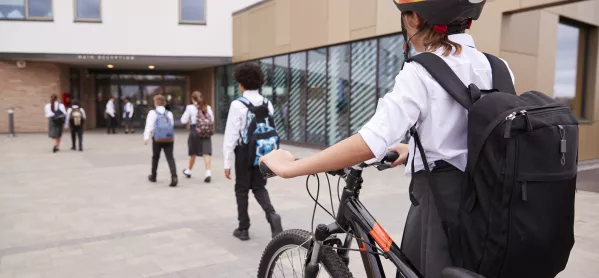Scotland’s first minister, Nicola Sturgeon, has told MSPs that schools “are not untouchable” when it comes to controlling the spread of the coronavirus, but that the government’s judgement for now is that it would do more harm to close them.
Today Ms Sturgeon and the chief medical officer for Scotland, Gregor Smith, have been giving evidence to the Scottish Parliament’s Covid-19 Committee.
Labour MSP Monica Lennon asked if schools were “untouchable”, if Ms Sturgeon regretted not extending the October break, and if she was considering extending the Christmas holidays.
The figures: Covid-19 staff and pupil absences
Research: Pupil attendance rate in Scotland highest in UK
News: Teachers ‘regarded as expendable’ in new Covid system
Ms Sturgeon said she did not regret not lengthening the October break because there was no evidence that had impacted on “our broader more general picture of transmission”.
Coronavirus: The case for keeping schools open
She said that, when dealing with the coronavirus nothing - including the closure of schools - could be “untouchable” because it was not sensible to take an “inflexible position”.
However, she made it clear her view remained that schools should stay open, even if that meant “at times greater restrictions on the rest of the population to facilitate and enable that”.
Ms Sturgeon said: “In the context we are dealing with just now, nothing is untouchable cause you can’t have that position because you can’t sit here and say, ‘Come what may, we will not do X,’ or, ‘Come what may, we will do Y.’ That would take us into that inflexible position that I just don’t think is sensible to have, given what we are dealing with.
“But with schools it is where I think the balance of harms comes most into focus. The more you have schools impacted, and the school experience of young people impacted, the more you are doing harm to young people through the lack of normal educational provision, and social interaction with peers and friends and wider networks, and our judgement, at the moment, is that is a greater harm than the harm having schools is doing in terms of the wider picture of transmission.”
Ms Sturgeon said that did not mean the government was in “any way blasé about safety in schools”. She said mitigation measures were being kept under review, new rules on face coverings had been introduced and discussions with parents and councils and teaching unions were ongoing. However, she said keeping schools open was a priority for Scotland - and it was becoming increasingly clear it was also a priority in other countries dealing with a resurgence of the virus.
She added: “I am firmly of the view - and I think this is increasingly reflected in other countries, including countries going back into very strict lockdown - that, if at all possible, our objective should be to keep schools open, cause I think that is in the interest of young people.
“And we will try to do that as far as possible, and the price of that may be at times greater restrictions on the rest of the population to facilitate and enable that, and I think that’s a trade-off that most people would think is worth making if we can possibly keep schools open.”
Dr Smith said it was possible to say with “a high degree” of confidence that transmission between primary children was “very unusual” and between primary children and adults was “similarly very unusual”. But there was “a gradient of risk” in terms of transmission as people got older and in upper secondary there was more evidence that transmission occurred between young people, and from young people to adults, although, he said, this was not as great as adult-to-adult transmission
Cases in schools tended to occur because of social events outside of school or within families or households, he added.





